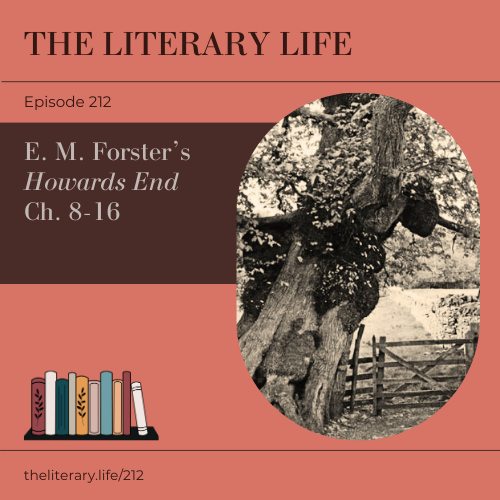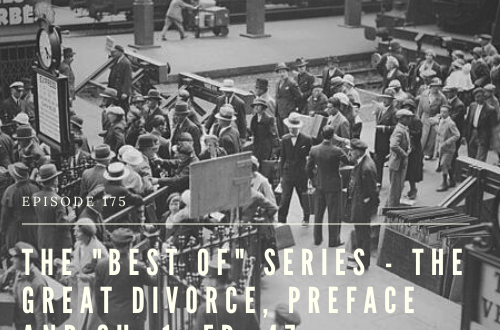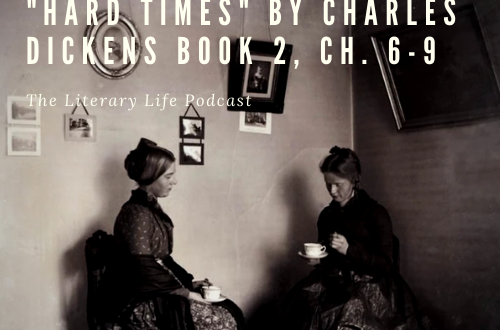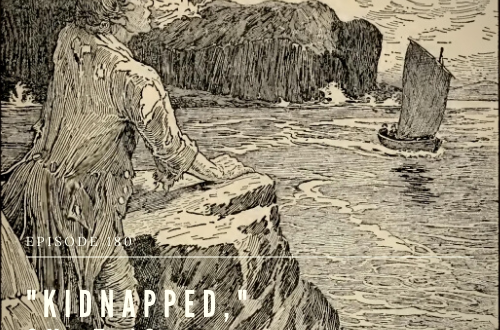
Episode 212: E. M. Forster’s “Howards End”, Ch. 8-16
Welcome to The Literary Life Podcast and our second episode in our series on E. M. Forster’s book Howards End. This week, Angelina and Thomas cover chapters 8-16, continuing their discussion of the book and the overarching concept of “Story” along the way. In talking about different plot points and characters, Angelina and Thomas make some comparisons between the two couples presented in these chapters and share some thoughts on the friendship between Margaret and Mrs. Wilcox. Angelina points out that Forster is doing some medieval things in this story, as we will see as we go on further. They also bring out more of the significance and symbolism of Howards End the place in the story.
If you want to check out our previous episodes on two of E. M. Forster’s short stories, you can find those here:
Episode 17: “The Celestial Omnibus”
Episode 99: “The Machine Stops”
We hope you will join us for the sixth annual Literary Life Online Conference, “Dispelling the Myth of Modernity: A Recovery of the Medieval Imagination.” During the live or later series of webinars, we will seek to dis-spell the Myth of Modernity and gain eyes to see and ears to hear Reality as it truly is. Speakers include Jason Baxter, Jenn Rogers, and Kelly Cumbee, in addition to Angelina and Thomas.
This March you can join Thomas and his brother James back for a webinar on King Alfred the Great. You can sign up at houseofhumaneletters.com.
Listen to The Literary Life:
Commonplace Quotes:
[The Greeks] were children with the intellects of men.
R. W. Livingstone, from The Greek Genius and Its Meaning to Us
It is astonishing how little attention critics have paid to Story considered in itself. Granted the story, the style in which it should be told, the order in which it should be disposed, and (above all) the delineation of the characters, have been abundantly discussed. But the Story itself, the series of imagined events, is nearly always passed over in silence, or else treated exclusively as affording opportunities for the delineation of character. There are indeed three notable exceptions. Aristotle in the Poetics constructed a theory of Greek tragedy which puts Story in the centre and relegates character to a strictly subordinate place.
C. S. Lewis, from On Stories
A Selection from “Terminus”
By Ralph Waldo Emerson
It is time to be old,
To take in sail:—
The god of bounds,
Who sets to seas a shore,
Came to me in his fatal rounds,
And said: “No more!
No farther shoot
Thy broad ambitious branches, and thy root.
Fancy departs: no more invent;
Contract thy firmament
To compass of a tent.
There’s not enough for this and that,
Make thy option which of two;
Economize the failing river,
Not the less revere the Giver,
Leave the many and hold the few.
Book List:
Aspects of the Novel by E. M. Forster
The Longest Journey by E. M. Forster
An Experiment in Criticism by C. S. Lewis
Support The Literary Life:
Become a patron of The Literary Life podcast as part of the “Friends and Fellows Community” on Patreon, and get some amazing bonus content! Thanks for your support!
Connect with Us:
You can find Angelina and Thomas at HouseofHumaneLetters.com, on Instagram @angelinastanford, and on Facebook at www.facebook.com/ANGStanford/
Follow The Literary Life on Instagram, and jump into our private Facebook group, The Literary Life Discussion Group, and let’s get the book talk going! http://bit.ly/literarylifeFB
Subscribe to The Lit Life:








